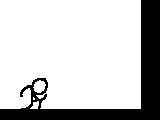Direct speech refers to reproducing another person’s exact words or saying exactly what someone has said (sometimes called quoted speech)
Here what a person says appears within quotation marks ("...") and should be word for word.
For example:
She said, "Today's lesson is on presentations."
or
"Today's lesson is on presentations," she said.
Here what a person says appears within quotation marks ("...") and should be word for word.
For example:
She said, "Today's lesson is on presentations."
or
"Today's lesson is on presentations," she said.
• indirect speech reproducing the idea of another person’s words that doesn’t use question mark to enclose what the person said and it doesn’t have to be word for word. Indirect speech is sometimes called reported speech
For example:
Direct speech :"I'm going to the cinema", he said.
Indirect speech : He said he was going to the cinema.
• When reporting speech the tense usually changes. This is because when we use reported speech, we are usually talking about a time in the past (because obviously the person who spoke originally spoke in the past). The verbs therefore usually have to be in the past too.
• Note : the reporting verbs that are usually used to report imperative sentence are :Tell , other command , ask , warn , remind
Present simple
Past tense
direct : Vita said “ I eat fried rice”
indirect :Vita said that she ate fried rice.
Past simple
Past perfect
direct : Mother said “ I went to market yesterday”
indirect : Mother said (that) she had gone to market the day before.
Future simple
Past future
direct : Dave said “ I will buy an i-pod next week’
indirect : Dave said (that) he would buy an i-pod the week after
Past tense
direct : Vita said “ I eat fried rice”
indirect :Vita said that she ate fried rice.
Past simple
Past perfect
direct : Mother said “ I went to market yesterday”
indirect : Mother said (that) she had gone to market the day before.
Future simple
Past future
direct : Dave said “ I will buy an i-pod next week’
indirect : Dave said (that) he would buy an i-pod the week after
Present continuous
Past continuous
direct : Gama said “ I’m playing football”
indirect : Gama said he was playing football
Past continuous
Past perfect continuous
direct : She said “ I was teaching earlier”
indirect : She said she had been teaching earlier
Past continuous
direct : Gama said “ I’m playing football”
indirect : Gama said he was playing football
Past continuous
Past perfect continuous
direct : She said “ I was teaching earlier”
indirect : She said she had been teaching earlier
when we want to report what someone said , wedon’t usually repeat their exact words , we use our words , we can use reporting words such as tell say as follow by “that clause”
example :
my mother said that she got up at 4 o’clock
example :
my mother said that she got up at 4 o’clock
DIRECT SPEECH | INDIRECT SPEECH |
Now Today/tonight Yesterday Tomorrow Last week Next week Ago | Then that day / that night The day before / the previous day The next / following day The previous week The following week / the week after Before |
DIRECT SPEECH | INDIRECT SPEECH |
This/these Here pronouns | That/those There They changes according to the context |
Type | Form | example |
Yes-no question | Ask + if / whether + S + verb wonder etc | do you speak English “ He wondered if I spoke English |
Wh-question | Ask + question word + S + verb wonder etc | “what are you watching” She asked what I’m watching |
DIRECT SPEECH | INDIRECT SPEECH |
will She said, "I'll teach English online tomorrow.“ can She said, "I can teach English online." must She said, "I must have a computer to teach English online.“ | would She said she would teach English online tomorrow. could She said she could teach English online. had to She said she had to have a computer to teach English online. |
DIRECT SPEECH | INDIRECT SPEECH |
shall She said, "What shall we learn today?" may She said, "May I open a new browser?" | should She asked what we should learn today. might She asked if she might open a new browser. |
DIRECT SPEECH | INDIRECT SPEECH |
"I might go to the cinema", he said. | He said he might go to the cinema. |






Tidak ada komentar:
Posting Komentar